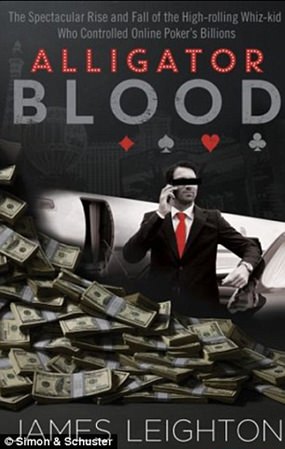After reading James Leighton’s book Alligator Blood (ISBN 978-1-47111-330-7, Simon and Schuster, 2013) I came to the conclusion that I have lived a very sheltered life.
Alligator Blood describes a player whose play is bold and aggressive (The Poker Encyclopedia). In fact I have only met one person in my life who played professional poker and competed in the World Series of Poker, a rich financial success that has seen nobody’s get to the top and become media personalities.

This book revolves around poker playing, financial dealings ‘almost’ within the law, profligate spending and those who indulge in this on-line fanaticism. Of course, as I live in Thailand, where gambling is illegal, that has sheltered me even further
Leighton’s book describes a Daniel Tzvetkoff who becomes the on-line money processing king, another field that I am not conversant with, dealing with e-money which floats around as electronic ledger items and where percentages get sliced off, without anyone really keeping the books. However, where the e-amounts are millions, even a small percentage is good money.
What is to be understood is that the credit cards and most big banks do not like handling the money from on-line gambling, and so this led to a new industry where the money was ‘processed’ before it went into the legitimate main steam. And this is where Daniel Tzvetkoff stepped into the breach.
In these financial e-businesses, it was easy to make money. Lending to risky customers, the interest rates were between 390 and 780 percent. So a few might go bad, but at such interest rates, who cared?
However, despite shell companies, paying into other shell companies as part of an electronic maze, it was still possible to find out that the money was coming from on-line gambling and lose that money. Like three million dollars frozen for two years, and no guarantee of it coming back. That was then followed by one of 10 million dollars.
Details of just who were involved in the on-line gambling are revealed as well as the fall-out after the FBI caught up with the leading players, including Daniel Tzvetkoff, whose fall from grace and the excesses of money ended up costing him everything.
After Daniel Tzvetkoff makes his plea bargain with the American Department of Justice, the book mysteriously goes into a diatribe as to whether playing poker is really against the law or otherwise. From there we are given pages describing a drug addict’s life and how he goes to Las Vegas and wins a fortune. Quite frankly the final quarter of the book has precious little relevance to the Daniel Tzvetkoff story before it. I suggest “filler” is the most appropriate word. There are some happy snaps as well for your B. 545.
Leighton has written this book in a conversational style, quoting dialogue between people, dialogue that he was obviously never there to record. This I found the biggest let-down in the book, as the story itself was gripping enough without records which were never possible, giving it a fictional feel; however, names like Michael Schumacher, Frank Tyson and Mick Doohan are real enough.




